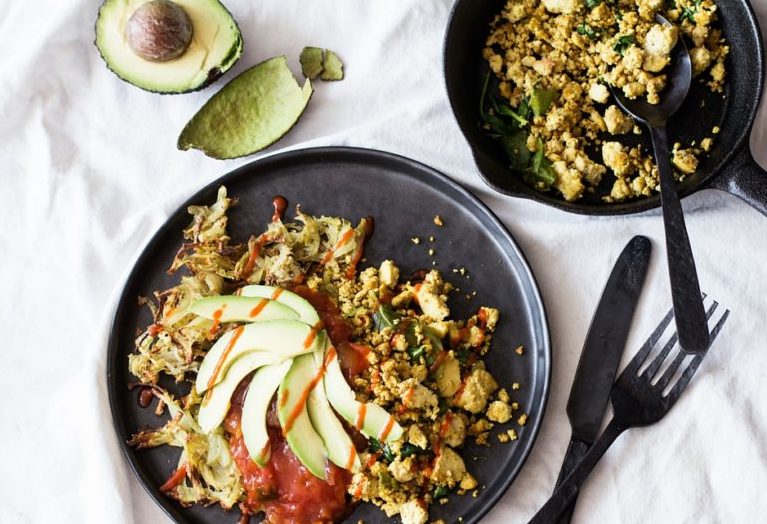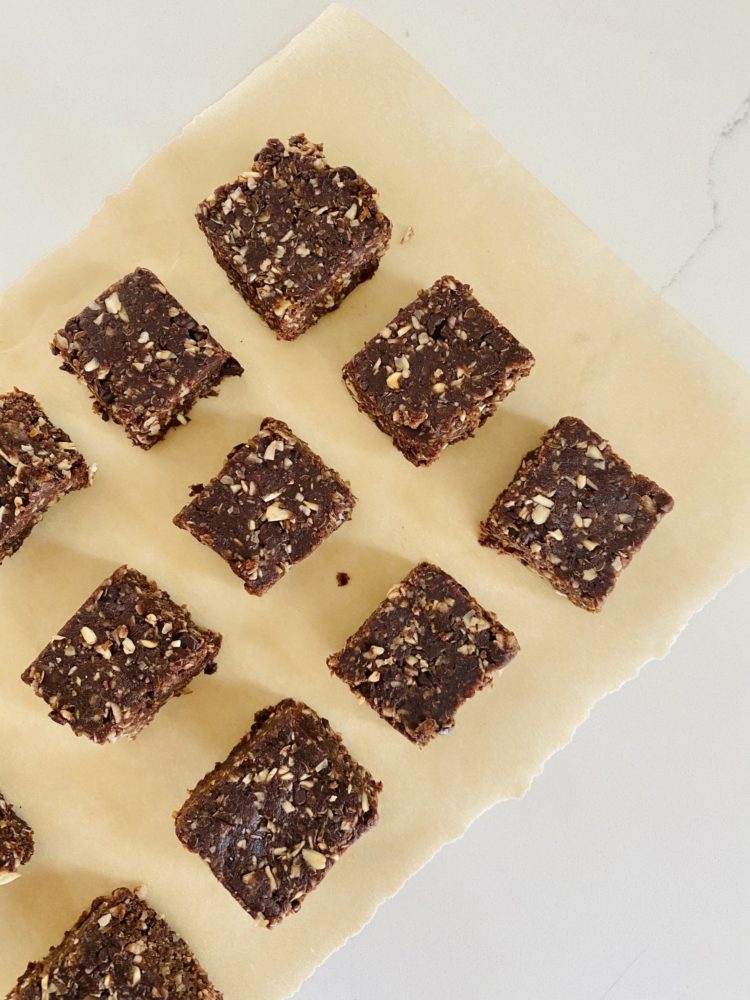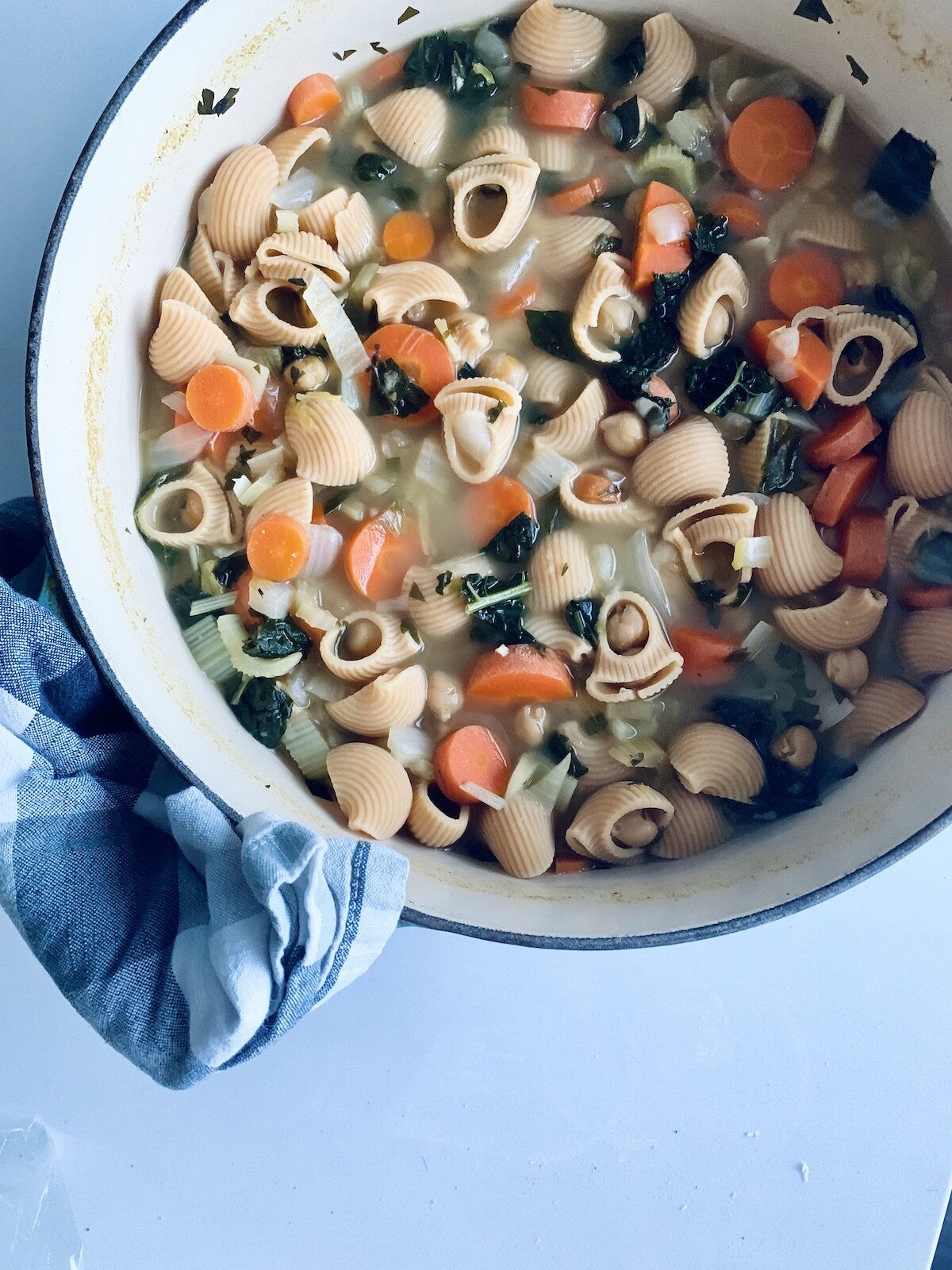Whether you’re brand new or a seasoned plant eater, this plant-based nutrition guide will tell you everything you need to know about the benefits of a plant-based diet and how to plan balanced plant-based meals so you meet your nutrition needs and feel satisfied too.
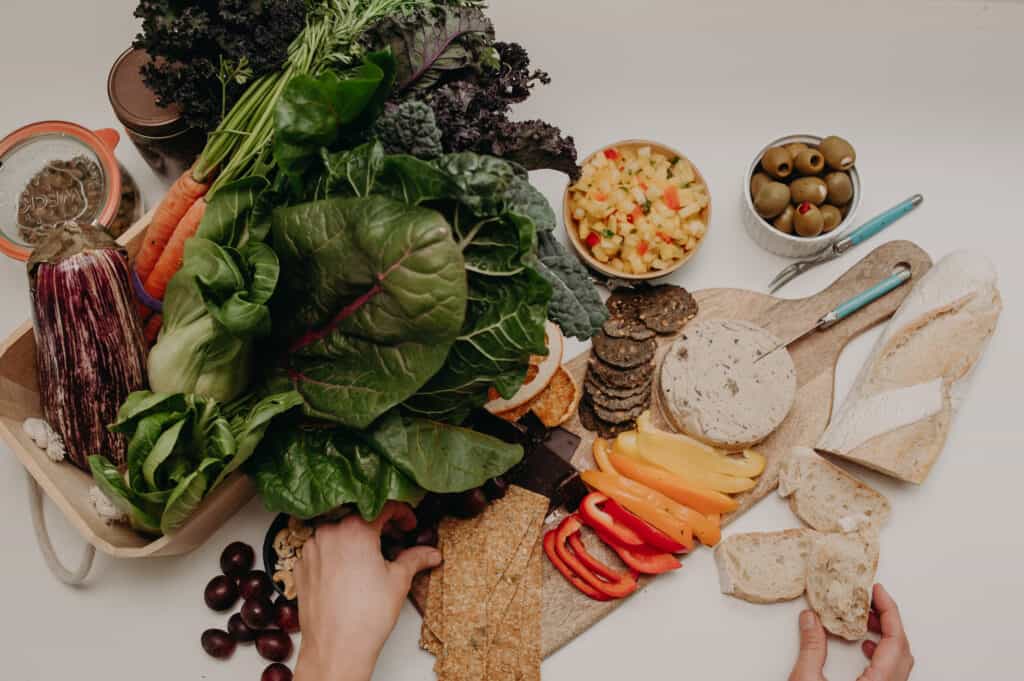
What is plant-based nutrition?
Before we jump in to the plant-based nutrition guide, let’s cover some basics. First, what does “plant-based nutrition” actually mean? You’ve probably seen this term used in many different ways to describe everything from completely vegan diets to diets that include meat and eggs. Let’s define some key plant-based terminology.
Whole Food, Plant-based (WFPB)
Whole or minimally processed vegetables, fruits, whole grains, beans, nuts, and seeds. Avoids meat, poultry, seafood, dairy, eggs, and oil. Usually followed for health reasons to prevent, treat, or reverse chronic diseases.
Vegan
Excludes all animal products including meat, poultry, seafood, dairy, eggs, and honey. A philosophy or way of living that is usually followed for ethical reasons to avoid cruelty and exploitation of animals.
Vegetarian
Excludes meat, poultry, and seafood, and may or may not also exclude dairy and eggs.
Lacto-vegetarian
A vegetarian diet that includes dairy products.
Ovo-vegetarian
A vegetarian diet that includes eggs.
Lacto-ovo-vegetarian
A vegetarian diet that includes both dairy and eggs.
Pescatarian
A vegetarian diet that includes seafood.
Plant-based
The term “plant-based” has no official definition which is why it can be confusing! Many people unofficially define a plant-based is a diet that is primarily made up of whole or minimally processed vegetables, fruits, whole grains, beans, nuts, seeds, and oils, and may or may not include minimal amounts of meat, poultry, seafood, dairy, and eggs. This definition allows for flexibility and customization.
In this Plant-based Nutrition Guide, we will use this flexible definition when we talk about plant-based nutrition. You get to decide if your version of “plant-based” means vegan, WFPB, pescatarian, or somewhere in between.
The Ultimate Plant-Based Nutrition Guide
Now that you understand what we mean by “plant-based nutrition”, let’s dive in to the benefits of eating plant-based.
The benefits of a plant-based diet
The benefits of eating a plant-based diet are far-reaching. In this guide we’re covering five of the top benefits women can expect to experiencing from eating plant-based.
1: Prevent Disease
Eating plenty of whole, plant-based foods has been shown to prevent, treat, and in some cases reverse certain chronic diseases. The evidence is overwhelming for heart disease and diabetes, but a plant-based diet has also been linked to prevention of reproductive cancers, autoimmune diseases, and even kidney disease.
2: Live Longer
Researchers have identified five locations in the world where people consistently live to be over 100 years old. These areas are called “blue zones”, and they are home to people who live long, active, healthy lives. Although these locations span the globe, they share many lifestyle habits. One of those shared habits is a plant-based diet. The specific foods they eat differ from culture to culture, but they all fill their plates with vegetables, fruits, beans, whole grains, nuts, and seeds.
3: Improve Gut Health
The gut microbiome is the new frontier of health. And although there is still much more to explore on this topic, most evidence points to the power of plant-based foods to cultivate a healthy gut. Why does gut health matter? An unhealthy gut microbiome is linked to everything from fibroids to heart disease. Feeding your gut plant-based foods helps good bacteria proliferate.
4: Balance Hormones
Hormone imbalance manifests as fatigue, mood swings, irregular periods, high blood sugar, endometriosis, and more. Many plant-based foods have been shown to help balance hormones and counteract hormone-related conditions. These foods include dark leafy greens like kale, beans and legumes, and plant-based fats like avocado and walnuts. High fiber diets are also associated with balanced hormones, and fiber is only found in plant-based foods. If you’re curious about other ways to balance your hormones, read this post.
5: Save The Environment
Not only is eating plant-based good for your body, it’s also good for the environment. In the landmark EAT-Lancet Report, the leading experts in nutrition, health, sustainability, and policy came to the consensus that a predominantly plant-based diet is the best eating pattern for both personal and planetary health.
The science behind plant-based nutrition
You might be wondering, “Is plant-based food actually healthier?” A large body of evidence supports plant-based nutrition for longevity, disease prevention and treatment, and overall health. It’s important to note that this evidence refers to whole and minimally processed plant-based foods like whole grains, beans, and vegetables. Oreos might be plant-based, but they don’t provide any health benefits beyond pleasure and enjoyment (which is okay!).
If you want to learn more about the health benefits of plant-based diets for women, read this guide.
Essential nutrients in a plant-based diet
Instead of focusing on individual nutrients, I like to think about foods as nutrient packages. Every food is a symphony of many nutrients that work in harmony with each other. For example, beans contain more than just protein. They also contain fiber, antioxidants, and iron. When you look at foods as packages, you’ll notice that plant-based foods contain more of the nutrients we want to maximize and fewer of the nutrients we want to minimize!
Some people believe the myth that plant-based diets are lower quality when it comes to nutrients. This is simply not true! Research shows that well-planned plant-based diets tend to have higher nutrition quality than diets that don’t emphasize plant-based foods. This is because plant-based foods are high in nutrients that most people don’t get enough of like fiber, phytonutrients, potassium, and calcium. Plant-based diets that focus on whole and minimally processed foods are also low in nutrients that most people get too much of like saturated fat, sodium, and added sugars.
When you go plant-based, it’s common to have questions about certain nutrients. This list often includes vitamin B12, vitamin D, iron, iodine, calcium, and protein. It is possible to meet all your nutrient needs with plant-based nutrition. Worrying about getting enough of these nutrients? Check out the links for easy tips to meet your needs.
How to build a balanced plant-based meal plan
The key to a healthy plant-based diet, or any diet for that matter, is to make sure it’s well-planned. By well-planned, I mean that you know what a balanced meal looks like and you make an effort to eat a variety of foods from different food groups throughout the day and week. In this section, we’ll cover the key food groups in a balanced plant-based diet.
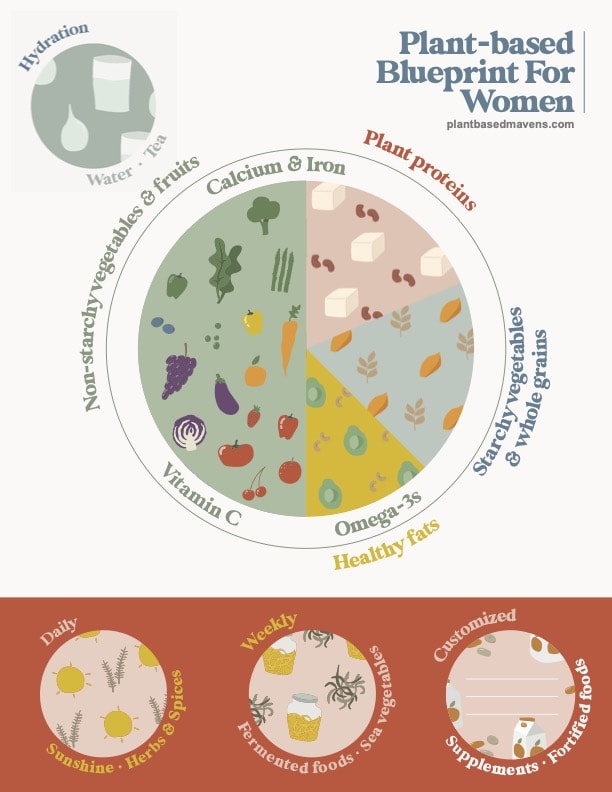
The Best Plant-based Protein Sources
One of the most common questions in plant-based nutrition: “Where do you get your protein?” The truth is it’s not that hard to meet protein needs with plant-based foods! Include protein-rich plant-based foods at every meal to meet your needs. These include beans, nuts, seeds, and soy foods like tofu, tempeh, edamame, and soy milk.
When it comes to plant-based protein, beans are the superstars! The health benefits of beans are endless. Aside from protein, beans contain key nutrients like fiber, antioxidants, iron, and calcium. Try to include beans in at least one meal per day. Try this Chickpea Salad or Three-ingredient Burger!
Another common question: “do I need vegan protein powder?” If you’re eating a variety of plant-based foods and including protein-rich plant-based foods at every meal, then a vegan protein powder is probably not necessary. If you want to give your smoothies a protein boost, try adding hemp hearts which contain 10 grams of protein per 3 tbsp. serving.
Incorporating fruits and vegetables into your diet
One of the greatest benefits of plant-based eating is the boost in fruits and vegetables. Even with all the controversy in the nutrition world, almost everyone agrees that fruits and vegetables are some of the healthiest foods on the planet. They provide fiber, water, phytonutrients, and important vitamins and minerals. Here are a few ideas for incorporating fruits and vegetables into your diet, plant-based or not.
- Add greens like spinach to a smoothie
- Snack on fresh fruit
- Add vegetables to any meal you’re already eating – add broccoli to mac and cheese, chopped peppers to chili, or spiraled zucchini to pasta
- Start lunch or dinner with a side salad
Plant-based fats
The fats found in most plant-based foods are unsaturated fats. They are considered “healthy fats” and support a healthy heart, healthy skin, and absorption of fat-soluble vitamins like vitamins A, D, E, and K. When you go plant-based, you don’t want to skimp on fats! Aside from their nutritional and health benefits, adequate fats also help you feel full and satisfied after a meal.
Healthy plant-based fats include nuts like walnuts and cashews, seeds like flaxseeds and pumpkin seeds, avocado, olives, and their respective oils.
Curious about going oil-free or which plant-based fats are considered less healthy? Read the PBM Fat Guide.
Plant-based carbohydrates
You might worry that a plant-based diet contains too many carbs. Plant-based foods do tend to be higher in carbohydrates, but remember to think about foods as packages. The carbohydrates found in plant-based foods come packaged with fiber, water, and other important nutrients. So, when it comes to carbohydrates it’s less about the amount and more about the type and what it is packaged with.
Carbohydrate-rich plant-based foods include whole grains like brown rice and quinoa, whole grain products like whole wheat pasta and brown rice noodles, and starchy vegetables like sweet potatoes and butternut squash. All of these foods include a symphony of important nutrients, so don’t be afraid to enjoy them!
To learn more about carbohydrates, check out the PBM Guide To Carbs and Women’s Health.
Plant-based supplements
Another common question that arises when you decide to go plant-based is whether or not you need to start taking supplements. While you can get what you need from plant-based nutrition, modern life prevents us from eating perfectly all the time. This is where thoughtfully chosen supplements can be helpful.
Some common supplements that people eating plant-based diets might take include vitamin B12, vitamin D, and iodine. Don’t take these supplements blindly. Do some research or talk to a plant-based registered dietitian to help you decide.
Plant-based alternatives
No plant-based nutrition guide would be complete without mentioning all of the meat, dairy, egg, and seafood alternatives filling the grocery shelves. It seems like you can find a plant-based alternative for everything these days! But are these plant-based foods actually healthier than their real counterparts? The answer: it depends.
Some of these foods like soy milk or a nut-based cheese contain high-quality ingredients and provide their own unique nutrition benefits. Other alternatives are considered ultra-processed with lengthy lists of unrecognizable ingredients.
I think it’s important to think about why you’re choosing the plant-based version. Do you have a craving for it? For example, I LOVE this Vegan Cheesy Sauce and crave it regularly. A “real” cheese sauce doesn’t even appeal to me. Or are you trying to satisfy a craving that might be better served by just eating the real thing?
Does it offer nutrition benefits you’re looking for? I love to include a fortified soy milk in my breakfast for protein, calcium, and vitamin D.
Are highly processed alternatives like Beyond Burgers and vegan mac and cheese regularly crowding out healthier plant-based foods? Just like any “fun foods”, it’s okay to include these foods occasionally for pleasure and enjoyment. the key is to make sure that you’re also meeting your plant-based nutrition needs with plenty of healthier options too.
Embracing a plant-based lifestyle for optimal health
Now that you know the benefits of plant-based nutrition and what makes up a balanced plant-based meal, you might be wondering how to get started. To wrap up this Plant-based Nutrition Guide, here are my favorite resources to get you started on your plant-based journey!
Start with my 3 step plant-based roadmap
Next download the FREE Plant-based Starter Checklist
Then try these 5 plant-based meal planning strategies
Finally, download the Weeknight Dinner Recipe Book for easy 30 minute dinner ideas
For healthcare professionals: The Safe and Effective Use of Plant-Based Diets with Guidelines for Health Professionals
